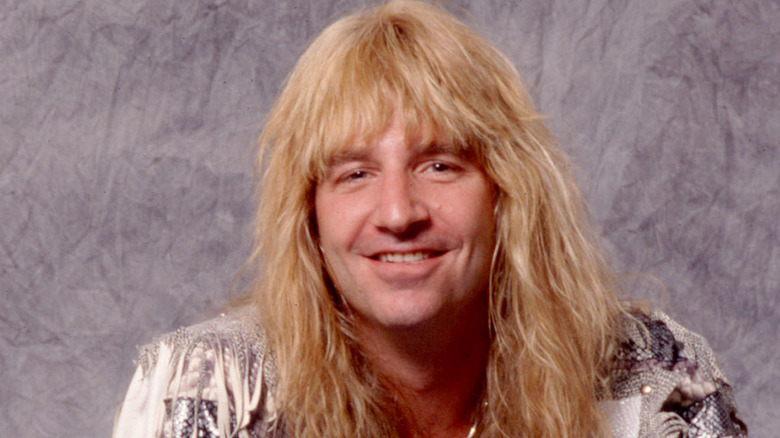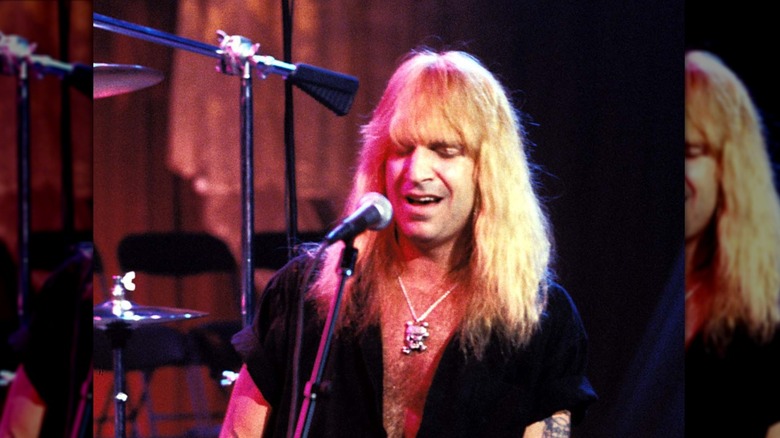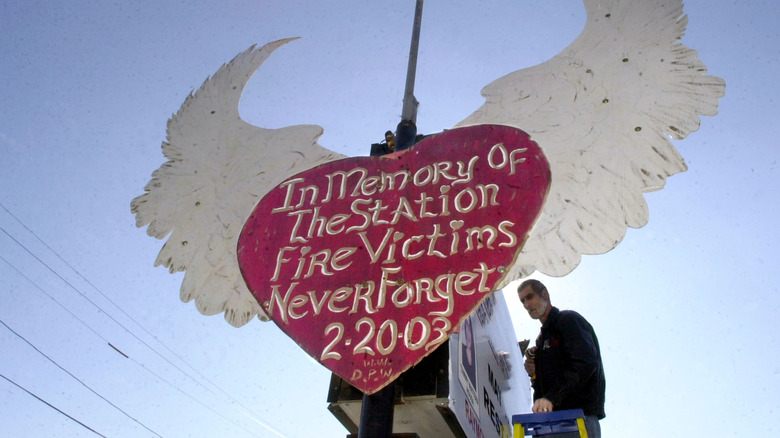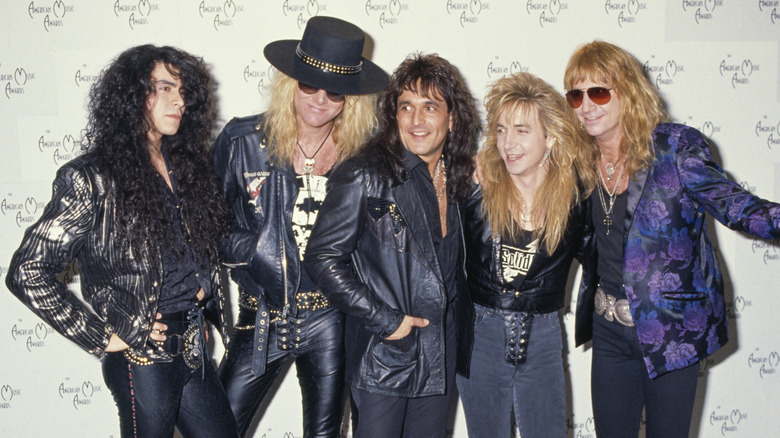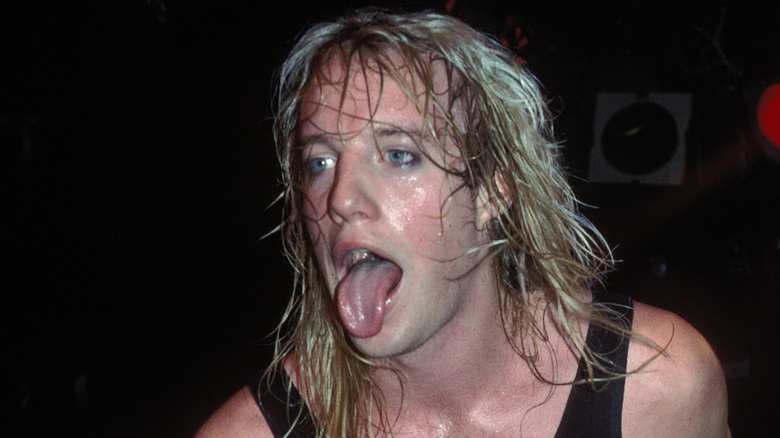The Tragedy Of Great White Singer Jack Russell Explained
As a hard rock band founded in Los Angeles and developed in the 1980s, Great White was lumped in with that city and decade's hair metal scene. In one of the most unlikely developments in the bizarre history of heavy metal, that riffs-and-hairspray-fueled movement took over mainstream rock in the late '80s and early '90s, and Great White found global success with big, loud, party-time hits like "Once Bitten Twice Shy," "Rock Me," and "Mista Bone." Also responsible for the brief but significant popularity of Great White was band co-founder and lead singer Jack Russell, who boasted a seriously soulful and bluesy voice and plenty of rock star charisma.
But during Great White's peak era, and after its fall from prominence, Russell suffered greatly in both his personal and professional lives. He endured a number of traumatic events that tore his band apart, upended his off-stage activities, and devastated his health. Russell would ultimately follow the trajectory of so many other rock stars: a period of brief success followed by heartbreak and struggle and then an untimely demise. Here's a look into the sad, tragic, and brutal life of Great White front man Jack Russell.
The following article includes descriptions of addiction.
Jack Russell shot a woman during a botched drug robbery
Guitarist Mark Kendall and singer Jack Russell met in Los Angeles in 1978 and would go on to form Great White in the early 1980s, a delayed launch following a stint in prison by Russell. Around the time that the future front man was creating the Great White sound, he was misusing a lot of cocaine and PCP, the latter being an illegal and powerful dissociative drug also known as angel dust. While intoxicated on PCP, an 18-year-old Russell and a group of friends broke into the Whittier, California, home of a known drug dealer to steal a quantity of cocaine. Joining the ranks of '80s rock stars accused of serious crimes, Russell was so intoxicated at the time that he couldn't fully recall the day in question.
"This is from the court transcripts because I don't remember," Russell told I'm Music Magazine (via Sleaze Roxx). "I went out to the patio because there was a maid out there watering and she said I asked her where the coke was. She told me there was no coke, just Pepsi and it was in the refrigerator." Thinking she was the victim of a prank, the maid sprayed Russell with a garden hose. He escalated the interaction into a physical altercation which led to him firing his revolver through a door, striking and seriously wounding the housekeeper. Arrested and charged by area police, Russell was convicted and sentenced to eight years in prison, while he ultimately served 11 months behind bars.
One hundred people died at a Great White concert
Whatever happened to all those famous '80s hair bands? By the early 2000s, and with their arena-filling heyday long since passed, groups like Great White were largely reduced to playing small, out-of-the-way clubs. That was the situation on February 20, 2003, when The Station in West Warwick, Rhode Island, hosted Great White. At the start of the show, the band's tour manager set off some effects toward the back of the stage. Being a significant fire hazard, The Station's owners claimed that they had not approved the use of pyrotechnics for the Great White concert. And tragically, those concerns proved real when the fireworks immediately started a fire that quickly grew out of control.
A panicked Jack Russell tried to help however he could, pouring cups of water on the flames, which kept spreading. He ultimately had to escape, leaving the club through a fire exit right by the stage. Meanwhile, the 400 or so concert attendees tried to leave out of the four displayed exits. Unfortunately, two of those pathways to safety had been barricaded, leading to a crushing mob at the exits that did work; a bouncer refused the use of the stage door to fans. As people struggled to get out, the fire grew and created more hazards like exploding alcohol bottles, cracked beams, and collapsing ceiling sections. When it was all over, 300 Great White fans got out of the destroyed nightclub — but 100 people died in the fire.
The Station fire stuck with Jack Russell
When Great White played West Warwick, Rhode Island, in 2003, it resulted in one of the most tragic times that fans died at a concert. As the lead singer of Great White, Jack Russell was present at The Station nightclub when 100 people who couldn't get out of the building died as the result of a pyrotechnics-caused fire. Among the dead: Great White guitarist Ty Longley. The tragedy would torment Russell, and negatively impact his mental health, relationships, and professional life, for years to come. "It's not like I've come to terms with it because I'll never get over it," Russell told L.A. Weekly in 2017. "There are so many times when I'll see a sunrise and I'll just start crying because there's 100 people that will never see that again, because they wanted to come and see me sing. Who I really feel horrible for are are the relatives that lost someone — wives, husbands, and family members."
Great White's manager Daniel Biechele took the legal fall for Russell and the band, entering a guilty plea and serving two years in prison for 100 charges of involuntary manslaughter. In the lawsuits levied against the band in the aftermath, the city of Warwick agreed to a $10 million settlement in 2008, while the families of the fire victims received a pool of $1 million in damages.
Jack Russell had a lot of medical issues in the 2000s
Following the deadly fire at The Station, Great White separated in 2005, canceling the last dates of an American tour due to "medical reasons," according to Pollstar (via Blabbermouth). Those health concerns turned out to be lead singer Jack Russell relapsing into substance misuse after eight years of sobriety. "My second marriage fell apart and I ended up going out and trying this all over again," Russell told KNAC. "I was just a mess."
After Russell got healthy again, Great White reunited for a 25th anniversary tour and album in 2007. However, Russell then endured a string of health problems and severe injuries, including a perforated bowel, a broken pelvis (which happened when the singer slipped on a bathtub during a curtain rod installation), and back problems, which he believes were exacerbated because his body was weakened by years of drug and alcohol addiction. "In my lower back I had a bulging disk and they did a surgery and two days later it re-herniated. They did another surgery," Russell told Glide Magazine.
In order to walk and perform Great White shows, Russell ingested a lot of pain medication, until during one show he stumbled over a cable, broke a leg bone, and underwent emergency surgery that involved the placement of a rod. "Now my left leg is two inches shorter than my right leg," he said.
Jack Russell and the rest of Great White sued each other
Sometimes, disputes lead to band members filing lawsuits against each other. Such a legal battle can tear apart a group that once consisted of close friends and artistic collaborators, and this is the legacy that resulted for Great White. In 2011, Jack Russell declared a "leave of absence" (according to legal documents, via Ultimate Classic Rock) from Great White to recuperate from perforated bowel surgery. In the wake of his departure, Great White – the band Russell helped create in the early 1980s – continued with new singer Terry Ilous, and so Russell sued in March 2012.
Weeks later, the non-Russell members of Great White fired a countersuit against their estranged lead singer. The suit alleged that Russell had not only harmed the band's image and marketability by skipping out on about 80 concerts over an 18-month period, he had also performed extremely poorly when he did show up to sing. Great White also took offense to how Russell hit the road under the Great White name, labeling it fraud because no other musicians on stage besides Russell came from the band's '80s/'90s lineup. The factions settled the lawsuit in 2013, and Russell was granted the right to operate with hired musicians as Jack Russell's Great White, while the other members of Great White could continue to perform as Great White.
Russell proclaimed future reunions unlikely. "Too many things have been said, and too many lies," he told "Rockin Metal Revival" (via Blabbermouth).
A famous friend's untimely death led him to quit drinking
Many Los Angeles bands of the 1980s came up together in the city's hair metal scene, and among them were Great White and Warrant. The respective lead singers of each band, Jack Russell and Jani Lane, formed a close friendship that lasted for the rest of the latter's lifetime. The tragic real-life story of Warrant's Jani Lane came to a sad and abrupt end in 2011. The rock star behind hits like "Cherry Pie" and "Heaven" had a well-documented issue with alcohol addiction. In 2009, Lane received probation after hitting a parked car while intoxicated, and in 2010 was sentenced to four months in jail for a similar incident. Lane was discovered dead at a motel in Woodland Hills, California, in April 2011, with a partially consumed bottle of vodka and prescription medicine nearby. The Los Angeles County Coroner later performed an autopsy and determined that the 47-year-old Lane died of alcohol poisoning.
The alcohol-related death of Lane, who in 2010 briefly replaced Russell in Great White, inspired Russell to seek out lasting and permanent sobriety. "My wife woke me up," Russell told L.A. Weekly in 2017. "She said, 'Your friend Jani Lane just died of alcohol poisoning. You might want to think about quitting drinking."
He was diagnosed with COPD and needed a new hip
In 2020, hard rock singer Jack Russell submitted to a left hip replacement surgery. "I finally said the pain was just too outrageous," Russell told WRIF (via Blabbermouth), admitting that he'd been needing a new joint for many years and that he'd pushed off the procedure because he worried it wouldn't fully eliminate back and leg pain. "I wish I would have done it 10 years ago," he added, also revealing that in the lead-up to the new hip, surgeons discovered the source of his pain: a bone fragment "as big as half a baseball floating around in my leg, in my thigh."
Russell's recovery involved learning how to walk properly with his new medical device, which added another issue on top of his diagnosed chronic obstructive pulmonary disease, otherwise known as emphysema and which can damage the lungs. Nevertheless, during the COVID-19 pandemic, which killed millions around the world, Russell continued to perform. "I can't afford to get sick. You know, I got COPD, been smoking for 40 years," he told The Cosmick View.
Jack Russell died young from Lewy Body Dementia
Into the 2020s, Jack Russell continued to often perform as the front man for Jack Russell's Great White. On July 17, 2024, he announced what was effectively the end of the group and his career as a rock performer, with a statement declaring his retirement on his band's Instagram account. "After a recent diagnosis of Lewy Body Dementia (LBD) and Multiple System Atrophy (MSA), I am unable to perform at the level I desire and at the level you deserve," he wrote. "Thank you for letting me live my dreams. Symptomatically linked to Parkinson's disease or Alzheimer's disease, Lewy Body Dementia occurs when protein clusters called Lewy bodies develop in the brain and critically affect the patient's ability to think, remember, move, and regulate moods and behavior. Multiple Symptom Atrophy is a seldom-diagnosed condition characterized by a lack of balance and coordination, muscle stiffness, and the inability to speak.
Just months after Russell was diagnosed with those serious medical issues, and just weeks after his health precluded him from performing anymore, the Great White singer died on August 15, 2024, from the effects of LBD and MSA. Russell was 63 years old.
If you or anyone you know needs help with addiction issues, help is available. Visit the Substance Abuse and Mental Health Services Administration website or contact SAMHSA's National Helpline at 1-800-662-HELP (4357).
